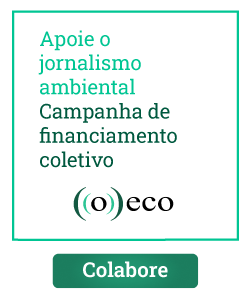In last month’s column, my colleague, Jennifer Mitchell, and I gave an introduction to Global Footprint Network, the Ecological Footprint, our Brazil calculator and the types of issues that we will focus on. You will find that occasionally our column will directly address recurring questions, themes and comments: our ultimate goal is not a one-sided conversation but an ongoing dialogue with you, the reader. That said, in this column I would like to address a comment posted by reader Hugo Penteado following our debut commentary. It is a question that I believe is at the very core of today’s greatest challenges: Can we maintain economic growth without sacrificing the ecological well-being of our planet? Penteado referred to current trends in economic growth as a “path to suicide”. On that point, we are in total agreement. Today’s economic model is no longer ecologically viable. As the recent global economic crisis proved, there are inevitable consequences to ongoing deficit. You can continue to use more resources than is available by drawing down on future assets – i.e., credit. But at some point, you will eventually hit a wall. Still, our economic model is one that values growth, regardless of this fact. So what we saw – and continue to see — is an incredible contradiction in that we ran into recession because we consumed too much, and yet our response has been to promote more consumption. We ran into recession because there is too much liquidity in the market, and yet our response has been to throw more liquidity into the system. Money has become so powerful that it out-values natural capital – without which, the global economy would not even exist. Our leaders worry more about stabilizing currency than stabilizing agricultural soils. But in the end, which is more important? This dilemma we face — and the question our leaders must ask themselves – is what I posed to participants of Footprint Forum 2010, held in Italy from June 4-13. The international gathering, hosted by Global Footprint Network in conjunction with the University of Siena, was attended by roughly 200 participants, among which included scientists, economists, and business and government leaders. The focus of the forum was to discuss today’s most urgent environmental challenges and develop strategies to meet them. Among the event’s diverse series of sessions included: “Natural Capital and Our Economy” and “Re-Thinking Growth”. We invited a panel of speakers who represented differing perspectives, among which included: Peter Victor, professor in Environmental Studies at York University; and Hannes Kunz, president of the Institute for Integrated Economic Research. Both agreed that we can no longer continue to have economic expansion on a planet with limited resources – unless we can somehow find a way to decouple economic growth from resource use. According to Hannes, we do not need to focus on rethinking economic growth, as a major correction to world gross domestic product (GDP) is inevitable. Instead, he said, we must focus on the transition to a no-growth economy. While ecological economists talk about rethinking economic growth to enable a sustainable world economy, the economist said, “…we don’t have to rethink growth. Growth is going to go away”. “The financial claims on the world economy — such as debt obligations, pension expectations, stocks, investments — can only be paid back by extracting more resources and converting them into financial assets. But we have a finite amount of resources, and those resources are becoming less and less available, so we’re trapped,” he said, cautioning assembled environmental experts that if this transition to a sustainable economy is not managed adequately “we won’t have a chance to build something good afterward.” According to Victor, however, it is possible to maintain a robust employment rate, reduce or eliminate poverty, maintain fiscal balance and reduce greenhouse gases without relying on economic growth. The key to achieving this, he said, lies in a major shift in policies, including: new meanings and measures of success; limits on materials, energy, wastes and land use; more meaningful prices; more durable, repairable products; fewer status goods; more informative advertising; better screening of technology; more efficient capital stock; more local, less global; reduced inequality; and less work, more leisure. I believe any change in our economic model must include looking beyond GDP. In his comment, Penteado cited a report by the Commission on the Measurement of Economic Performance and Social Progress – which was created by French President Nicolas Sarkozy and chaired by Nobel Prize winning economist Professor Joseph E. Stiglitz of Columbia University. The document, known as the “Stiglitz Report”, recommended a more comprehensive approach toward gauging a country’s success, beyond GDP. Penteado pointed out that in this report, the Ecological Footprint, though cited as a possible indicator, was criticized for being “anti-trade”. To clarify, The Footprint tracks current human demand on nature in terms of the area required to supply the resources used and absorb the waste emitted in providing goods and services. Trade is accounted for by allocating this demand to the country that ultimately consumes these goods and services. This accounting reflects import and export flows, but makes no judgment regarding the benefits, disadvantages or fairness of trade. The Ecological Footprint is therefore neither pro- nor anti-trade. Indeed, Penteado, Hannes, Kunz, the authors of the Stigltiz report, and I can all agree that business-as-usual will eventually lead to no business at all. Opinions vary on what changes are necessary to reverse our trends, but this ultimate conclusion remains. I believe each country must decide what their optimal resource consumption is in order to maintain a level of social, economic and environmental well-being that is in harmony with one another, and that is sustainable. This is why we continue to promote the use of the Ecological Footprint and why we continue to improve the science and methodology behind it. In the end, I believe Penteado and I are more in agreement than he may have realized. Mathis Wackernagel is the president of Global Footprint Network and co-creator of the Ecological Footprint. You can e-mail responses to this column or send suggestions for other topics at [email protected]. For more information on Global Footprint Network, go to www.footprintnetwork.org.
Leia também

Três anos após tragédia, 203 hectares de encostas em São Sebastião seguem em recuperação
Deslizamentos ocorridos em fevereiro de 2023 deixaram 853 cicatrizes de desmatamento na cidade. Cerca de 70% da área já está recoberta de vegetação →

Disputas e contradições continuam após a COP30
Plano Clima indica desafios de implementação; evitar mudanças profundas continua sendo uma linha de ação que envolve greenwashing, lobby e circulação de desinformação →

Como transformar a meta 30×30 de um slogan político para uma realidade ecológica
O recém-aprovado Tratado do Alto-Mar oferece uma oportunidade de proteger o oceano como nunca antes →





